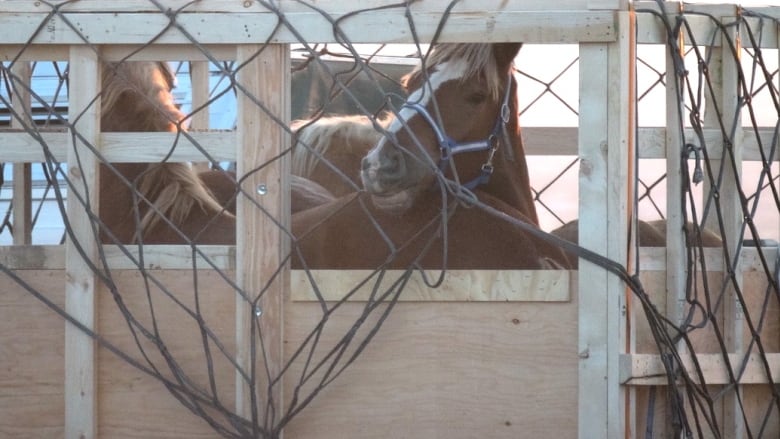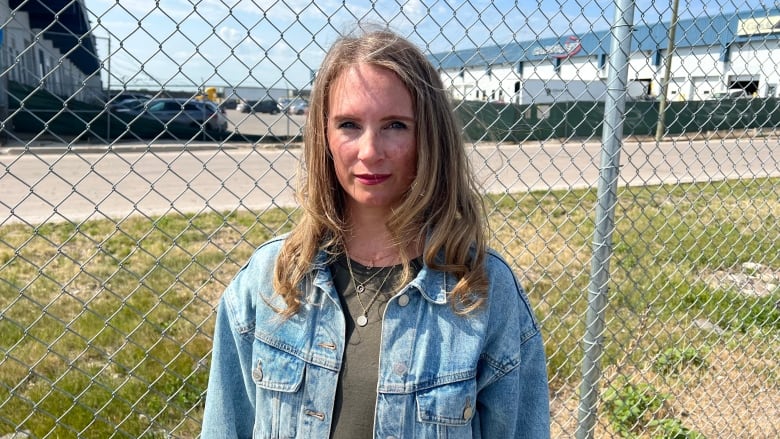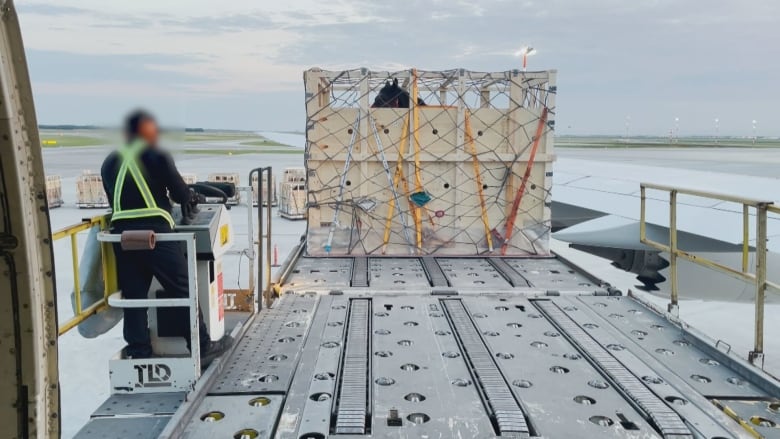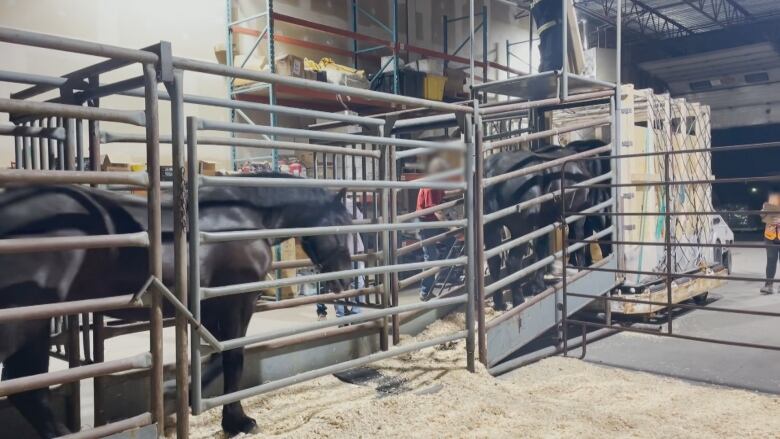Senator, Liberal MP move to ban export of live horses for human consumption
Draft horses are flown around the world to be slaughtered and served raw

From behind a fence at Winnipeg's airport, Kaitlyn Mitchell watched horses arrive for a journey across the world by plane destined for plates.
"It's absolutely devastating,"said Mitchell, director of legal advocacy with Animal Justice, a Canadian animal rights charity. "You see these gentle draft horses pulling up in trucks in the dead of the night."
The horses are mostly Clydesdales and Percheronsbred in Canada specifically for human consumption. Between 2,000 and 3,000 of them are flowneach year from airports in Alberta and Manitobamore than 8,000 kilometres to Japan.
The entire trip is permitted by law to last up to 28 hours with no stops to give the horses food, water or resta practice Mitchell calls "appalling."
"These horses experience extreme stress," she said. "They're at risk of injury. We know that they collapse at times during this journey. And we're doing this to them all to serve a niche market overseas.
"It causes tremendous suffering."

Prime minister called for ban nearly 2 years ago
Once they arrive in Japan, the horses are fattened up for several months before being slaughtered and eaten rawas a delicacy.
Now, a senator andLiberal MP are both hoping to legislate a ban on the export of live horses from Canada overseas for human consumption.
Liberal MP Tim Louis introduced one of the bills last monthand Sen. Pierre Dalphondtabled one in June. They come nearly two years after Prime Minister Justin Trudeau directed his agriculture minister to end the practice.
"There's been a huge lack of political will on the part of the minister," Mitchell said, adding that aban could be imposed immediatelybyamending the Health of Animals Regulations.
In December 2021, Trudeau directed then-agriculture minister Marie-Claude Bibeau to "ban the live export of horses for slaughter."After receiving a petition this past March,Bibeau said her department was doing consultations.
Lawrence MacAulay, who became Canada's agriculture minister in this summer's cabinet shuffle, declined CBC's requests for an interview.
"We take the issue of animal welfare very seriously," a statement from MacAulay's office says. "I look forward to getting briefed on this file and working with my colleague Tim Louis on this important issue."

$19 million a year industry
Louis's private member's bill suggests fines of up to $250,000 and two years of jail time as penalties for those who violate a ban.
Canada slaughters domestically some 120,000 unwanted horses each year for meat. But these two billstarget the niche industry that breeds them exclusivelyfor human consumption and exports them whilestill alive so their meat can be served fresh.
"Horses experience significant stress during such flights and are at risk of injury because of [their] tendency to panic easily and their strong fight-or-flight response to fear and stress," Louis'bill says.
Sen. Dalphond said he introduced his private member's billbecause the minister hasn't taken action.
"I wish the government would have acted through regulations, but it seems that they prefer to let the senators and MPs do the work," he said.
"The time has come to act upon that promise that was made to Canadians. There's no purpose to expose sentient beings to that kind of treatment, just because it's good business."
According to Statistics Canada, Canada exported 2,600 live horses to Japan last year at a value of $19 million.

Horses transported humanely: auditor
"Canadian horse is very, very highly regarded around the world as high quality," said Jennifer Woods, an Alberta-based animal welfare specialist who audits the transport of the horses from Canada to Japan.
Woods said she sees first-hand that the horses are transported under humane conditions.
"The animals are not crammed into the containers like people say they are. The animals actually have more space than they're required," she said."They have very good ventilation. They do not experience the stress on the planes that some people believe they do."
Woods said all animals, regardless of their "end use," must be transported according to the same regulations.
"These horsesI would say not only meet, but they exceed the standards of the other animals," she said.
Canadian Food Inspection Agency (CFIA) veterinary inspectors are at the airport for each shipment, she added.
CFIA would not provide CBCwith an interview andinstead pointedto a fact sheet about the shipment of live horses. CFIA said it's aware of five horse deaths related to air shipments to Japan in the last ten years, a mortality rate of 0.011 per cent.

Animal welfare, or discomfort with eating horse?
Woods said she believes the push to ban this horse meat industry has less to do with animal welfare and more to do with the discomfort many people feel with the idea ofeating horse.
"I have a hard time understanding why it's okay to eat cattle or to eat sheep, chickens or pigs, but horses now have this special category," she said. "It is very much a cultural thing. But over 3 billion people around the world actually consume horse meat.
"I don't believe we should be shutting down an industry that is really doing nothing wrong. They're not doing anything illegal."
But Mitchell with Animal Justice points to a case in December 2022 of a shipment of meat horses from Winnipeg that exceeded the 28 hour travellimit. Her group filed a legal complaint with the Canadian Food Inspection Agency, but the CFIA did not take enforcement action.
"Canada has some of the worst animal transport laws in the western world," she said. "What we're talking about here is shipping live animals across the world, so they can be eaten raw by wealthy individuals in another country."
Mitchell said many Canadians are shocked to find out this industry exists here.
"The reason that the industry has gone on as long as it has is mostly because of that, because people were unaware."













_(720p).jpg)


 OFFICIAL HD MUSIC VIDEO.jpg)
.jpg)



























































































